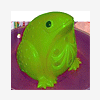-
Welcome to the eG Forums, a service of the eGullet Society for Culinary Arts & Letters. The Society is a 501(c)3 not-for-profit organization dedicated to the advancement of the culinary arts. These advertising-free forums are provided free of charge through donations from Society members. Anyone may read the forums, but to post you must create a free account.
Eggplant: to salt or not to salt
-
Similar Content
-
- 11 replies
- 944 views
-
- 18 replies
- 2,658 views
-
- 33 replies
- 3,783 views
-
- 8 replies
- 1,048 views
-
- 40 replies
- 6,770 views
-
-
Recently Browsing 0 members
- No registered users viewing this page.





Recommended Posts